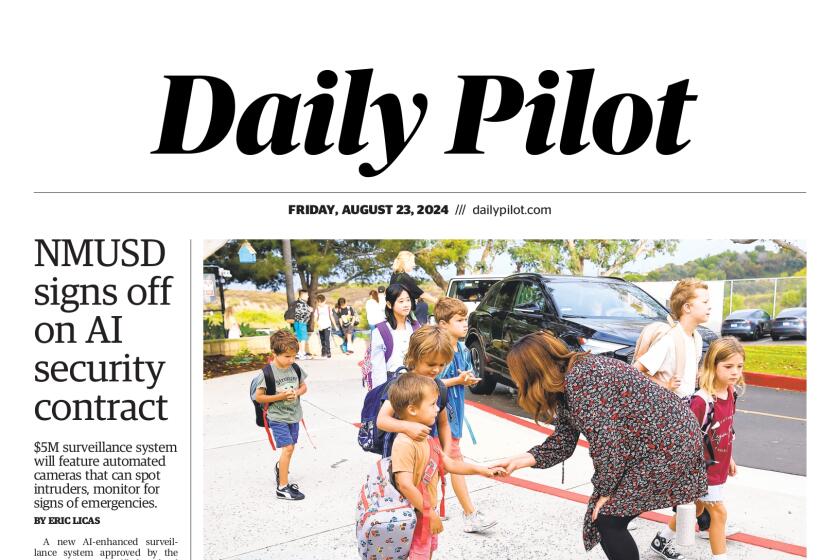FOCUS ON HEALTH:
For some kids, the biggest problem with eating peanut butter might be how to get it unstuck from the roof of their mouth.
But for Oliver Johnson, a 7-year-old kindergartner at Newport Heights Elementary School, eating peanut butter could kill him.
Oliver suffers from a life-threatening food allergy to any type of nuts, a fact his parents discovered the hard way when their son was 13 months old.
“My introduction to this scary world of food allergies came when my husband and I decided to give Oliver his first taste of peanut butter,” mom Jill Johnson said.
Oliver’s dad dipped the end of a pretzel stick in a little bit of peanut butter and handed it to the toddler.
“His tongue barely touched it when he instantly started crying, clutched his tongue and began projectile vomiting. I called [Children’s Hospital of Orange County], and they told me to call 911 immediately because my child was going into anaphylactic shock.”
Jill Johnson described Oliver’s face as unrecognizable at that point, swollen and covered in hives. He was rushed to Hoag Memorial Hospital Presbyterian, where doctors administered epinephrine by injection, standard treatment for reducing the swelling associated with anaphylaxis.
If just avoiding allergenic foods were enough, life might be somewhat easier for Oliver, his parents, and younger brother Montgomery, 4, who is allergic to not only nuts, but eggs and beef as well. Unfortunately, in addition to avoiding eating those foods, children can’t be exposed to anyone or anything that might have been contaminated by those foods.
Oliver can’t even touch another child at school if he or she has eaten a peanut butter and jelly sandwich because there might be peanut butter residue on their hands.
Lunch tables need to be designated as “nut free.” What about playground equipment or school supplies that children share? Exposure is all it would take for Oliver to suffer an immediate and possibly life-threatening episode.
At Newport Heights Elementary School, Jill Johnson said she’s had nothing but positive reinforcement from teachers, lunch aides and the principal.
An emergency kit containing instructions and “Epipens” are kept in Oliver’s classroom and in the nurse’s office. With one quick jab of the pen — which is how Oliver explained it has to be done — epinephrine is dispensed into the bloodstream.
Oliver wears a medical alert bracelet, and is old enough now to recognize the warning signs and tell someone if he was exposed to something. Oliver said he knows exactly what to do. He’d go right up to the adult in charge and let them know what was happening.
“I would say I feel like I’m having an allergic reaction,” Oliver said, munching on his nut-free, crispy chocolate bar.
At home, Jill Johnson found herself making three different meals at three separate times for three kids. The boys’ 6-year-old sister, Izzy, is allergy free, and Jill Johnson found herself totally anxious around food, especially at mealtimes.
Enter Melanie Silverman, a registered dietitian and internationally board-certified lactation consultant with her company, Feeding Philosophies in Laguna Beach.
“She came into my house, like the ‘Super Nanny’ of food. She told me you’re making yourself crazy and not creating a healthy atmosphere around food for your family,” Jill Johnson said.
For new patients, dealing with food allergies in their children is a very scary ordeal, Silverman said, and her goal is to educate parents and “preserve my mothers,” who are most often the ones burdened when it comes to meals.
“I teach them what to eat, how to eat and how to deal with everything surrounding food. How to provide a wide variety of healthy foods, and how to cook the least amount they can,” Silverman said.
Sending Oliver to a public school was scary, Jill Johnson said, but she realized that as he got older, she had to be comfortable letting him go.
“We’re learning all this together, and Monty gets every rule applied to him. My younger one has a great role model,” Jill Johnson said.
For Oliver, having to watch what he eats, especially at school, is not a problem. He has friends who sit with him at the nut-free lunch table and volunteer to throw their food away if it could be a problem.
“It’s easy because I have some really good friends who know about my food allergies and make me feel safe,” Oliver said.
MORE INFORMATION
Sunday through May 17 has been designated Food Allergy Awareness Week by the Food Allergy and Anaphylaxis Network. Go to www.foodallergy.org.
SUE THOENSEN may be reached at (714) 966-4627 or at sue.thoensen@latimes.com.
All the latest on Orange County from Orange County.
Get our free TimesOC newsletter.
You may occasionally receive promotional content from the Daily Pilot.



